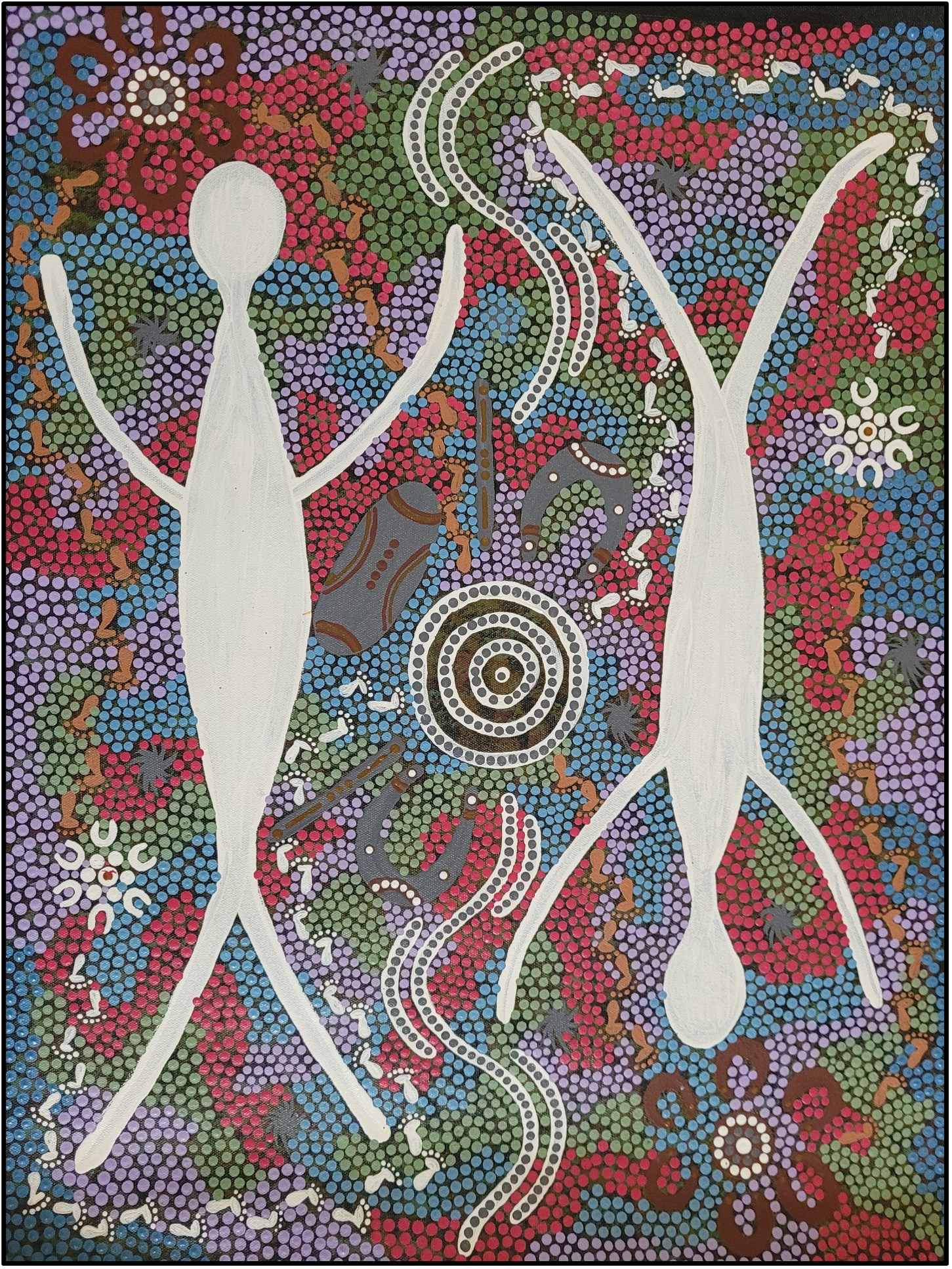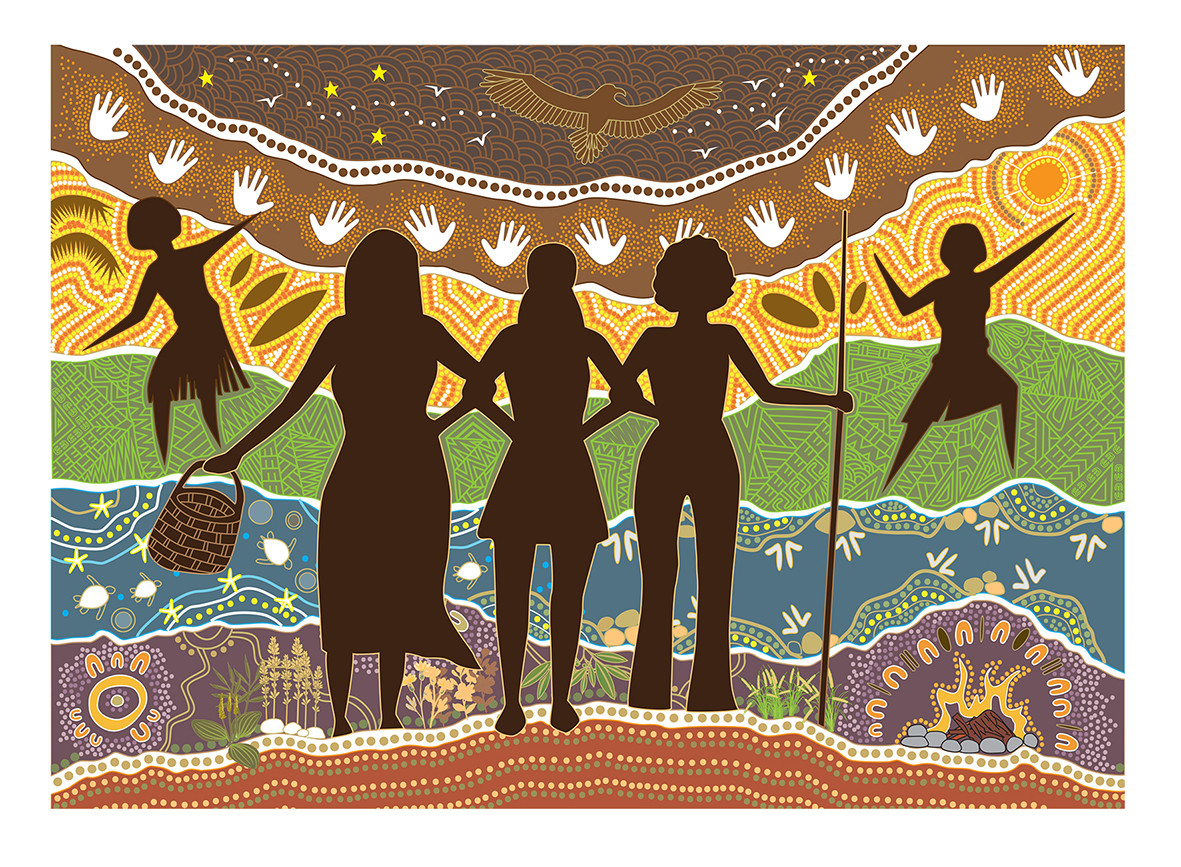Understanding the lives of Aboriginal and Torres Strait Islander women who have experienced a traumatic brain injury through family violence
Artwork: ‘Strong Women, Strong Culture, Strong Families’ by Michelle Tyhuis
Summary
In Australia, the intersection of family violence and traumatic brain injury and its implications are now being recognised in the formulation of family violence policies and frameworks. Yet, little qualitative research exists around how surviving this experience impacts their lives, particularly Aboriginal and Torres Strait Islander women. This project aims to explore the nature and context of women's lives who are living with the consequences of head injury from family violence and how women rebuild their life and identity after the injury.
The project objectives are to:
- Understand how women experience the transition from hospital back to community and country after hospitalisation for a TBI
- Understand how services support women during their journey of return from hospital to community and country
- Identify the key supports and issues for women and their families living with TBI
- Understand what is important for women and their families living with TBI
- Identify the strengths and gaps in service delivery for women living with TBI
Study Design
This 3-year exploratory project is being conducted across three Australian jurisdictions (Northern Territory, Queensland and New South Wales). The findings from this project will help to (i) inform the development of resources for Aboriginal and Torres Strait Islander women, their families and service providers and (ii) will seek to bridge the gap between research and practice to help inform the delivery of services.
Funding: Australian Research Council Discovery Early Career Researcher Award (DE210100639)
Research team:
- Dr Michelle Fitts, Institute for Culture and Society, Western Sydney University
- Adjunct A/Professor Jennifer Cullen, Synapse Australia
- Dr Gail Kingston, Townsville Hospital and Health Service
- Professor Karen Soldatic, School of Social Sciences, Western Sydney University
- Yasmin Johnson, Institute for Culture and Society, Western Sydney University
- Elaine Wills, Institute for Culture and Society, Western Sydney University
Project Advisors
- Shirleen Nampjinpa Campbell and Carmel Simpson, Tangentyere Women's Family Safety Group
- June Riemer, First Peoples Disability Network
- Jody Barney, Independent Social Justice Advocate
- Salli-Ann Buttigieg, Townsville Hospital and Health Service
- Myra Fordham, Author and Independent Social Justice Advocate
- Larissa Ellis, Women's Safety Services of Central Australia
Publications:
Fitts, M.S., & Soldatic, K. Exploring the dynamics between homelessness and healthcare access for Indigenous women with traumatic brain injury from family violence: A qualitative study. BMC Health Service Research. (under review)
Fitts, M.S., Cullen, J., Montgomery, R., & Duffy, G. It's been like a spiritual awakening for me": The impacts of traumatic brain injury education with Indigenous women in the Australian correctional system. Frontiers in Education. (under review)
Wills, E, & Fitts, M.S. Listening to the voices of Aboriginal and Torres Strait Islander women in regional and remote Australia about traumatic brain injury from family violence: A qualitative study. Health Expectations. (under review)
Fitts, M.S., & Soldatic, K. Temporalities of emergency: The experiences of Aboriginal and Torres Strait Islander women with traumatic brain injury from violence waiting for healthcare and service supports. Health Sociology Review. (in press).
Fitts, M.S., Johnson, Y. & Soldatic, K. (2024). The Emergency Department Response to Indigenous Women Experiencing Traumatic Brain Injury from Family Violence: Insights from Interviews with Hospital Staff in Regional Australia. Journal of Family Violence. https://doi.org/10.1007/s10896-023-00678-5
Fitts, M.S., Cullen, J., & Barney, J. (2023). Barriers Preventing Indigenous Women with Violence-Related Head Injuries from Accessing Services in Australia. Australian Social Work. 76(3), 406–419, DOI: 10.1080/0312407X.2023.2210115
Fitts, M.S., Cullen, J., Kingston, G., Johnson, Y., Wills, E., & Soldatic, K. (2023). Using research feedback loops to implement a disability case study with Aboriginal and Torres Strait Islander communities and service providers in regional and remote Australia, Health Sociology Review, 32:1, 94-109, DOI: 10.1080/14461242.2023.2173018
Fitts, M.S., Cullen, J., Kingston, G., Johnson, Y., Wills, E., & Soldatic, K. (2023). Understanding the Lives of Aboriginal and Torres Strait Islander Women with Traumatic Brain Injury through Family Violence in Australia: A Qualitative Study Protocol. International Journal of Environmental Research and Public Health, 20(2):1607. https://doi.org/10.3390/ijerph20021607
Fitts, M.S., Cullen, J., Kingston, G., Wills, E., & Soldatic, K. (2022). “I Don’t Think It’s on Anyone’s Radar”: The Workforce and System Barriers to Healthcare for Indigenous Women Following a Traumatic Brain Injury Acquired through Violence in Remote Australia. International Journal of Environmental Research and Public Health,19, 14744. https://doi.org/10.3390/ijerph192214744
Articles:
Fitts, M., Cullen, J., & Soldatic, K. First Nations women are 69 times more likely to have a head injury after being assaulted. We show how hard it is to get help. (10 November 2022)
Fitts, M., & Cullen, J. First Nations women don’t always access health care after head injuries from family violence. Here’s why. (15 June 2023)
Contact person:
Michelle Fitts at m.fitts@westernsydney.edu.au; 0412 216 264 (based in Mparntwe/Alice Springs)

Journey Home After Brain Injury' by Shirleen Nampajinpa Campbell
About the artists:
Michelle Tyhuis (b. 1980), is an accomplished Aboriginal and Torres Strait Islander contemporary visual artist who has also built a successful career as a professional journalist and graphic designer over the past 20 years. Michelle is a direct descendant of Meriam Mer peoples of the Saisarem tribe, Erub, Torres Strait, on her mother’s side; has Dutch ancestry on her father’s side, and has kinship ties to the Barkindji and Darug peoples of New South Wales. She proudly identifies as Zenadh Kes (Torres Strait Islander). Michelle’s artworks are inspired by her deep spirituality and connection with culture and creation (the natural world). She has a passion for understanding her own cultural identity, and for sharing a strong sense of belonging through her artworks and their stories.
Proud Anmatyerre and Arrernte woman, Shirleen Nampijinpa Campbell is a fifth-generation resident of Alice Springs Town Camp, Lhenpe Artnwe – or Hoppy’s Camp. She is also the Coordinator of the Tangentyere Women's Family Safety Group, which gives women in the camp a voice and action against family and domestic violence. Shirleen has been selected as an NT Local Hero 2020 in the Australian of the Year Awards.





